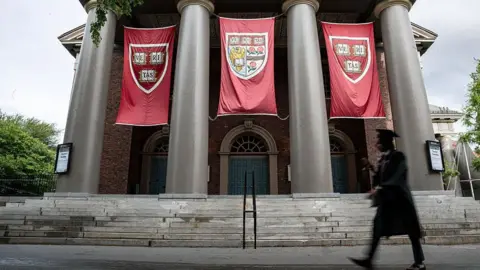Trump administration seeks to pull estimated $100m in Harvard funding
 Getty Images
Getty ImagesThe Trump administration will direct US federal agencies to review Harvard University's grants to potentially end or redistribute funding, as part of the White House's escalating battle with America's oldest university.
The Government Services Administration (GSA) plans to circulate a letter to agencies asking them to identify whether Harvard contracts could be "cancelled or redirected elsewhere", a senior White House official said.
The administration estimates about 30 contracts, collectively worth $100m (£74m), could be reviewed. It already had frozen $2.65bn in federal grants and tried to revoke Harvard's ability to enrol international students.
Harvard University did not immediately comment.
On its website, the university says that its "cutting-edge medical, scientific, and technological research" has historically been "supported by the federal government" and other entities.
Touting the institution's research on cancer, heart disease, infectious diseases and obesity, the university website warns that "without federal funding, this work will come to a halt midstream".
The White House will not revoke the funds automatically, but rather kick off a review of money Harvard receives from the federal government to determine whether that funding is critical in the eyes of the administration.
GSA will recommend each agency "terminate for convenience each contract that it determines has failed to meet its standards", and consider reallocating those funds elsewhere.
A draft of the letter accuses Harvard of engaging in discrimination and antisemitism as justification for the move.
An administration official told the BBC that potential cuts would not affect hospitals affiliated with Harvard University.
And if a federal grant was deemed critical to a particular agency's functions, they said, that agency could make a case to preserve funding.
The White House and Harvard have been locked in a political, legal and financial battle - the stakes of which have dramatically escalated over the past two months.
This is not the first time the administration has attempted to block Harvard's funding. In April, the White House threatened the university's tax exempt status and froze $2.2bn in federal funding, prompting a lawsuit. A month later, it cut another $450 million in grants.
Last week, the Trump administration also tried to revoke Harvard's ability to enrol international students or host foreign researchers, prompting mass confusion among thousands of impacted students and another lawsuit from Harvard. A judge later issued a temporary restraining order blocking the move.
Before news broke of the latest attempt at cuts, Harvard University president Alan Garber told NPR on Tuesday morning: "Why cut off research funding?
"Sure, it hurts Harvard, but it hurts the country because after all, the research funding is not a gift.
"The research funding is given to universities and other research institutions to carry out work – research work – that the federal government designates as high-priority work.
"It is work that they want done. They are paying to have that work conducted."
One department hit by funding cuts is the Sinclair Lab at Harvard Medical School, which studies aging and seeks to find interventions for Alzheimer's disease, multiple sclerosis, cancer, infertility, immune disorders, and more.
"We aim to understand and reverse the underlying mechanisms of aging to develop treatments for a wide range of diseases and tissue injuries," the lab's founder, anti-aging geneticist David Sinclair, told the BBC via email.
Under the Trump administration, the laboratory lost a National Institutes of Health grant, and researcher Kelly Rich lost a career grant to study age reversal to combat motor diseases. The White House's move to revoke Harvard's ability to host international researchers had affected six people - half of the laboratory's staff.
"The loss of funding not only halts ongoing experiments that cannot simply be restarted, but also jeopardizes the contributions of international scholars who are integral to the lab's operations and the wealth of the US," Mr Sinclair said.
Adam Nguyen, a Harvard alumnus and founder of the admissions consulting firm Ivy Link, said that the potentially "hugely negative" impact would fall on graduate and PhD students. Academics from both the US and abroad rely on outside funding for their research, he said.
"If you have the cuts, they're out of a job," Mr Nguyen said. "It's as simple as that. There's no money to fund their research. You're talking about cuts, lay-offs and immediate stop-work orders for many graduate students."
